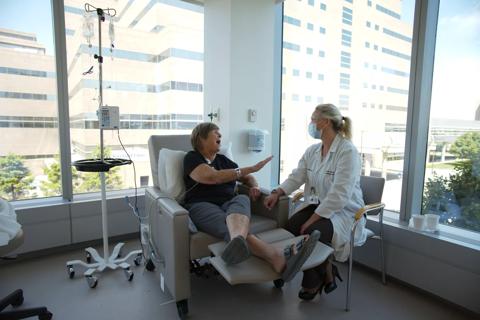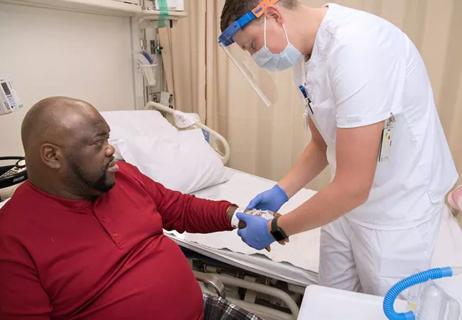CRNAs safely deliver 49 million anesthetics each year

Providing anesthesia care and pain management in all healthcare settings, certified registered nurse anesthetists (CRNAs) are highly educated advanced practice registered nurses (APRNs) who are a vital part of Cleveland Clinic’s anesthesia care team.
Cleveland Clinic is a non-profit academic medical center. Advertising on our site helps support our mission. We do not endorse non-Cleveland Clinic products or services. Policy
According to the American Association of Nurse Anesthetists (AANA), there are nearly 54,000 CRNAs and student registered nurse anesthetists who deliver 49 million anesthetics to patients each year. More than 300 of these advanced practice providers work in Cleveland Clinic’s Anesthesiology Institute.
Cleveland Clinic’s anesthesiology program for training student nurse anesthetists was one of the nation’s first, having celebrated its 50th anniversary last year. The CRNA credential was introduced in 1956, although, nurse anesthetists have been serving patients for more than 150 years and were the first healthcare providers dedicated to the anesthesia specialty.
CRNAs are a vital part of the perioperative care team and fulfill many roles and responsibilities that contribute to excellent patient outcomes. Together with the physicians, CRNAs provide for a patient’s safety and comfort before, during and after anesthesia. CRNAs remain by the patient’s side to advocate, monitor, collaborate and provide comprehensive anesthesia care for them throughout a surgery or procedure.
CRNAs provide anesthesia as a part of the anesthesia care team, which may include general, regional anesthesia, sedation and pain management, for all surgical and medical procedures. They are educated, trained and experienced in managing emergency situations in a variety of settings.
“CRNAs practice in every aspect of nursing – medical, surgical, pediatrics, obstetrics, inpatient/outpatient, beginning of life care, end of life care and everyone in between,” says Brittany Irwin, MSN, CRNA, RN, Cleveland Clinic’s Senior Director of CRNAs/CAAs. “We research, educate and lead. As a CRNA, you have to know it all – every type of medication, technology and procedure.”
Irwin has been a CRNA within Cleveland Clinic health system for 17 years and she says there’s no other job she would rather do.
“Being a CRNA encompasses some of the most incredible parts of nursing. CRNAs are nurses at our very core, making our care individual, holistic, scientific, sound and compassionate,” says Irwin. “When you become a CRNA, you sign up for a lifetime of fast-paced, intense moments – a constant balancing act of physiology, medicine and heart.”
What makes a good CRNA? Irwin says it’s someone who is self-motivated, empathetic, intelligent, a critical-thinker, a team player and a great communicator. She adds that CRNAs also need to be able to read people and situations – quickly.
CRNAs begin caring for a patient by reviewing the patient’s history and collaborating with the physician and perioperative team to individualize the plan of care for each patient. The CRNA secures everything that is needed to deliver safe anesthesia care, including monitoring devices, anesthesia equipment and medications – making sure everything is in place for a smooth anesthesia experience.
Patients presenting for surgery or other procedures often feel vulnerable and afraid. The CRNA comforts and reassures the patient as they review the plan of care with them, addresses any concerns the patient may have, and offers reassurance, empathy and compassion. Although the patient interaction is brief, it requires the CRNA to develop a good rapport with the patient in a very short time.
“Sometimes we meet patients on the worst day of their lives and other times, like when someone is having a baby, it’s the best day of their lives. To be able to capture the essence of nursing – that of mind, body and spirit – in a 10-minute period is amazing,” Irwin notes. “We hold the patient’s hand, offer a smile, look them in the eye and let them know it will be okay.”
Once the patient becomes anesthetized, the CRNA is 100-percent focused on the patient. The CRNA monitors and responds to all of the patient’s physiologic needs – keeping everything in balance. They constantly collaborate and communicate with the anesthesiologist, surgeon and other members of the perioperative team. CRNAs adjust the anesthetic to match the moment-by-moment needs of the patient and the consequences of the procedure. And, when it’s all said and done, the face of the CRNA is one of the first faces a patient sees when they wake up, Irwin notes.
Becoming a CRNA isn’t easy. Generally, CRNAs complete an average of 3.5 years or more in critical-care nursing before entering a nurse anesthesia education program. Admission into a nurse anesthesia school is rigorous and competitive.
The education to become a CRNA is at the graduate level and currently requires a master’s degree, but by 2025, all graduates will complete doctoral-level programs. On average, graduate school takes a minimum of 24 months to complete and is increasing to a minimum of 36 months. Upon completion, students will have administered approximately 850 anesthetics throughout a period of 2,500 clinical hours.
Following graduation, students are eligible to take the National Certification Examination. Students must pass this exam to become a practicing CRNA. Initial certification is good for a period of 4 years. CRNAs then enter the Continued Certification Program, requiring 100 credits of continuing education every 4 years, four online learning modules, and an examination every 8 years. They also must maintain current state licensure and a substantial anesthesia practice.
“This is a very challenging career that requires individual motivation beyond the monetary benefits or prestige associated with the career – you have to be driven and really want to care for patients as a nurse within an advanced area of practice,” Irwin comments. “If you want to get involved in advanced practice and you want to continue to achieve professional goals by advancing your education, working as a team in a more autonomous mode of patient management, and enhancing your contribution to healthcare, nursing and your patients – becoming a CRNA is a good draw.”
CRNAs provide access to high-quality anesthesia care in all types of settings. They are particularly essential in rural and medically underserved areas, and in all branches of the military.
A recent study published in Nursing Economic$ reported that CRNAs are essential to providing anesthesia care in U.S. counties with lower‐income populations and populations that are more likely to be uninsured or unemployed.
Join Cleveland Clinic in honoring, thanking and celebrating our CRNA colleagues! National CRNA Week was January 19-25. Happy Year of the Nurse!

Amanda Clark uses leadership skills to improve local healthcare access, mentor colleagues

Caregiver thrives despite the challenge of profound hearing loss

Mercy Hospital welcomes new chief nurse

New Lutheran Hospital CNO values quality and evidence

Nurse practitioner is a big believer in patient-caregiver collaboration

Leadership sectors include APRN and nursing quality

Fast-paced nursing environment full of reward

Experienced nurse leader Shannon Pengel appointed